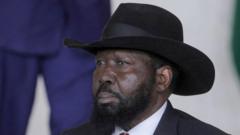In a bid to alleviate a growing visa dispute with the United States, South Sudan has agreed to allow a man deported from the US to enter the country. This move comes after the US announced a blanket visa ban on all South Sudanese citizens due to the government's refusal to accept repatriations. The situation underscores a deteriorating relationship amid domestic unrest in South Sudan.
South Sudan to Welcome Deportee Amid US Visa Tensions

South Sudan to Welcome Deportee Amid US Visa Tensions
South Sudan’s government has decided to accept the return of a man deported from the US, shifting its stance following a visa dispute. This issue has implications for US-South Sudan relations amid escalating tensions in the country.
South Sudan has announced it will now permit the entry of a man who was recently deported from the United States, marking a significant change in the government's position as it seeks to resolve an escalating visa dispute. This decision follows an ultimatum issued by US Secretary of State Marco Rubio, who stated that the US would implement a visa ban on all South Sudanese citizens if the country did not cooperate in repatriating its nationals.
Initially, South Sudan's foreign ministry defended its earlier stance by claiming that the deported individual was misidentified as a South Sudanese citizen when he was actually of Congolese origin. Following Rubio's announcement, South Sudan's government conveyed it would welcome the deportee "in the spirit of friendly relations" while instructing relevant airport authorities to facilitate his arrival in the capital, Juba.
This incident highlights the competitive nature of diplomatic relations between South Sudan and the US, particularly as Rubio underscored the urgency for South Sudan's transitional government to promptly accept the returns of its citizens. He indicated that further review of US policies towards South Sudan would occur only upon enhanced cooperation from the South Sudanese government.
The US’s broad visa measures against South Sudan came as a surprise, being the first such action against all passport holders of a specific nation since previous anti-immigration measures were discussed. Leaders in South Sudan expressed their discontent regarding the US actions, deeming them a disproportionate response to misunderstandings stemming from an individual case.
Amid this diplomatic tussle, fears loom that South Sudan might face a renewed civil conflict as tensions rise due to the recent house arrest of First Vice-President Riek Machar, accused by President Salva Kiir of inciting unrest. The US has since ordered the evacuation of non-emergency staff from the country, reflecting growing concerns over security and stability.
To add to the complexities, many South Sudanese in the US had previously been granted Temporary Protected Status (TPS), which is due to expire shortly. As the situation continues to evolve, both nations must navigate the challenges presented by this diplomatic rift, the safety of citizens, and the broader implications for regional stability.






















